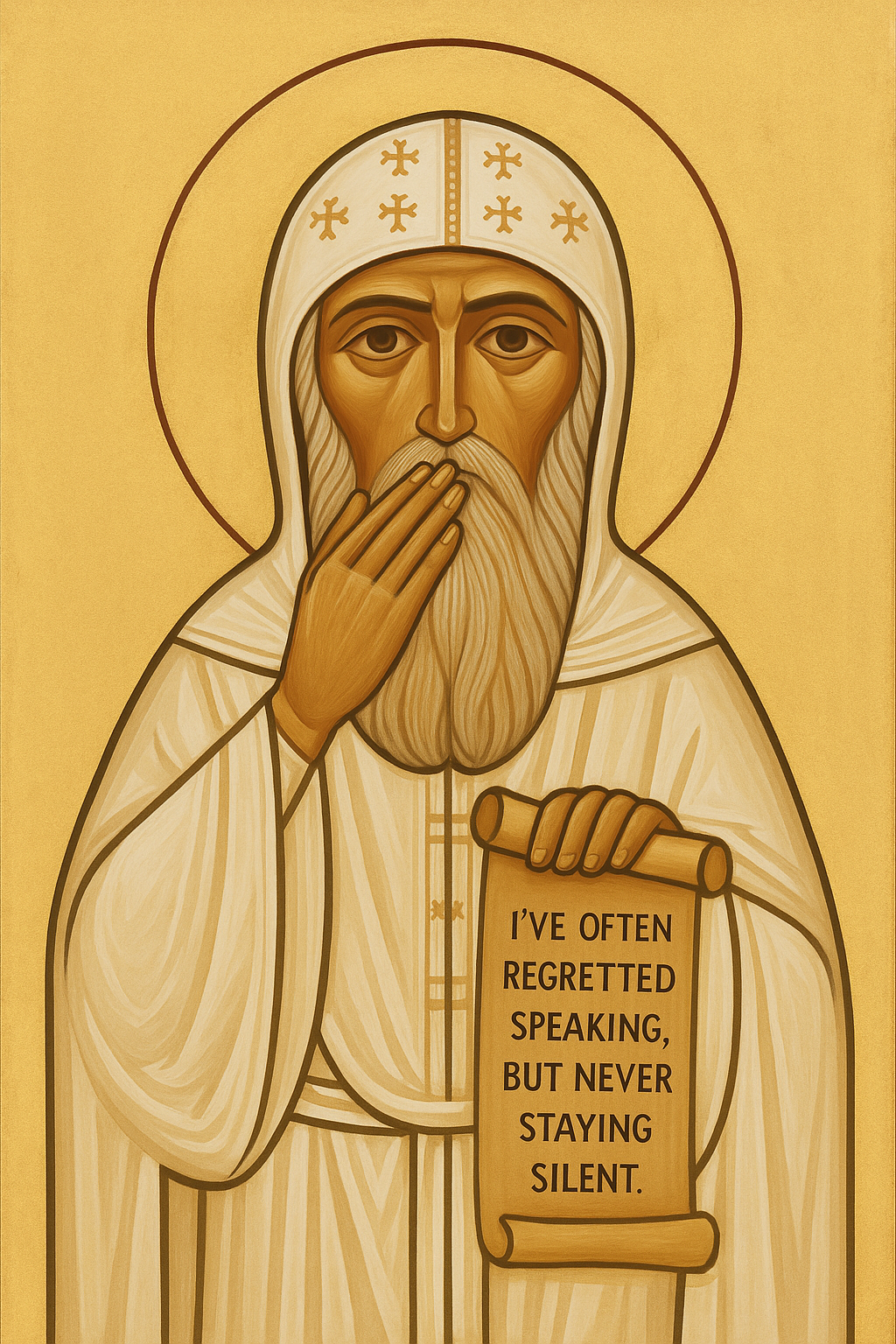Saint Arsenius the Great: A Silent Teacher, A Crying Heart
In the Name of the Father, and the Son, and the Holy Spirit, One God. Amen.
May the blessing of the Father who calls us, the Only Begotten Son who saves us, and the Holy Spirit who sanctifies and transforms us be with us all, that we may hear His word and bear fruit—thirty, sixty, and a hundredfold. Amen.
Beloved brothers and sisters in Christ,
Today, we remember and reflect on the life of a man who once taught the children of kings but later chose to be taught by the silence of the desert: Saint Arsenius the Great—a Roman noble, a scholar of Greek and Latin, and a prince among monks. His journey is one of radical transformation, deep humility, and unceasing repentance.
I. His Early Life: From the Palace to the Desert
Saint Arsenius was born into wealth and nobility around 350 A.D. in Rome. His father was a senator and judge, but more importantly, his parents were righteous and devout. From childhood, Arsenius was educated in both sacred and secular knowledge. His life could have followed the path of comfort and glory. Yet from an early age, he desired something more—something eternal.
As the Lord Jesus says in the Gospel:
“What will it profit a man if he gains the whole world, and loses his own soul?” (Matthew 16:26, NKJV)
Though Arsenius gained much in this world—wealth, knowledge, and honor—he knew that the soul is the true treasure.
He was ordained a deacon, then an archdeacon under Saint Damasus, Bishop of Rome. Later, Emperor Theodosius called him to teach his sons, Arcadius and Honorius. But in the imperial courts, Arsenius’s soul remained restless. The splendor of the palace could not satisfy the hunger of his heart.
So, at the call of God, he left everything behind.
II. Fleeing to the Desert: The Hidden Wisdom
He fled to Egypt, the heartland of desert monasticism, and was tested by Saint John the Dwarf (Short). He was not welcomed with applause or honor. Instead, he was made to stand, to be ignored, and to eat bread thrown on the floor. And he received it all with humility.
Here lies the first lesson: The desert doesn’t flatter. It purifies.
In a world that clings to recognition, humility is the gate to transformation.
“God resists the proud, but gives grace to the humble.” (James 4:6, NKJV)
Arsenius used to say,
“I have not yet learned the alphabet of the saints.”
This, from a man who was a master of languages, logic, and literature.
He admitted that although he had mastered Greek and Roman wisdom, he had not yet begun to learn the wisdom of the saints—a wisdom written not on scrolls, but on hearts shaped by prayer, silence, and tears.
III. Tears of Repentance: The Language of the Desert
Saint Arsenius is remembered most not for what he spoke, but for how he wept.
His eyelashes were worn away by the tears he shed—tears over his sins, over the weakness of the kings he once taught, and over the state of the world.
He used to say:
“I have always something to repent for after having talked, but have never been sorry for having been silent.”
This teaches us that true speech flows from silence, and silence is not emptiness, but the fullness of God’s presence.
Saint Arsenius would lift his hands toward heaven on Saturday evening and stand in prayer all night until the morning sun touched his face. These were not mechanical prayers but a communion of longing and contrition.
“The sacrifices of God are a broken spirit,
A broken and a contrite heart—
These, O God, You will not despise.” (Psalm 51:17, NKJV)
Are we learning this inner life? Do we know how to be silent, how to weep, how to kneel—not just with our bodies but with our hearts?
IV. Simplicity and the Sacraments: The Heart of the Church
Though Arsenius lived in extreme solitude, he never abandoned the Church sacraments. He participated in the Liturgy, confessed, received the Eucharist, and lived under spiritual obedience.
Even while weaving mats and drinking foul water to discipline his body, he relied on the grace of the Holy Mysteries to sanctify his soul.
His self-imposed poverty was not a prideful rejection of the world, but a complete dependence on Christ.
“Blessed are the poor in spirit,
For theirs is the kingdom of heaven.” (Matthew 5:3, NKJV)
He refused to inherit his cousin’s fortune, saying,
“I died eleven years ago. I cannot be his heir.”
What power is in that death! To die to the world is not sadness—it is freedom.
In our time, let us also examine ourselves: Do we treat the sacraments with reverence? Do we run to confession? Do we come early to the Liturgy? Do we prepare our hearts before Communion?
V. Practical Applications: How Shall We Imitate Saint Arsenius?
- Seek Silence in Your Day Find moments—real, uninterrupted moments—for silence and reflection. Put away distractions. Even 10 minutes a day to be silent before God can awaken the soul.
- Repent Regularly Go to confession often. Like Saint Arsenius, weep over your sins, not with shame but with love. “Godly sorrow produces repentance leading to salvation.” (2 Corinthians 7:10, NKJV)
- Humble Yourself in Community Let us not seek praise in our homes, churches, or workplaces. As Arsenius sat on the floor and received the bread thrown before him, so too must we learn to accept correction, discomfort, and obscurity.
- Prioritize the Kingdom Parents, do not only prepare your children for college and careers. Prepare them for eternity. Teach them to love Scripture, the sacraments, and holiness. Arsenius once taught princes—but chose instead to be taught by peasants and illiterate monks.
“Seek first the kingdom of God and His righteousness, and all these things shall be added to you.” (Matthew 6:33, NKJV)
- Be Ready to Change at Any Age Arsenius left the world at an advanced age. Let no one say, “It’s too late for me.” There is no age limit to repentance. There is no time when God’s arms are closed.
VI. His Holy Death: The Fear of God and the Peace of Christ
Saint Arsenius died around age 95, having spent over 40 years in the desert.
When his disciples saw him weeping on his deathbed and asked, “Are you afraid of death, Father?”
He replied,
“Indeed I am. This fear has never left me since I entered the desert.”
This is holy fear, not dread. A fear mixed with love and awe before the face of God. He died with peace—the peace that surpasses understanding—and with the humility of one who never saw himself as righteous.
“The end of all things is at hand; therefore be serious and watchful in your prayers.” (1 Peter 4:7, NKJV)
Conclusion
Beloved,
Saint Arsenius stands before us not as a speaker, but as a witness of stillness, a vessel of tears, and a beacon of repentance.
He reminds us that true learning is not in books, but in broken hearts.
He teaches us that silence can heal, that repentance purifies, and that the Church sacraments nourish us unto eternal life.
Let us follow his example—not by fleeing to the desert, but by creating a desert in our hearts—a sacred place where we meet Christ, where we cry, and where we are made whole.
“Pray to the Lord on our behalf, O holy righteous father Saint Arsenius, teacher of kings, that He may forgive us our sins.”
May the prayers of Saint Arsenius the Great be with us all. Amen.
May the Lord bless us, transform our hearts and minds, that our homes may stand on the Rock, our hands serve in the harvest, and our hearts long for Heaven. Amen.

